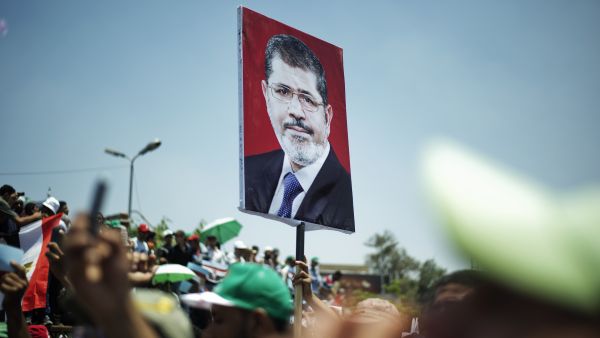Tens of thousands of Egyptian Islamists gathered in a show of strength Friday ahead of planned opposition protests against President Mohammed Mursi, highlighting tense political divisions in the most populous Arab state.
Carrying Egyptian flags and portraits of the president, they packed the large square outside Cairo's Rabaa al-Adawiya mosque in the Nasr City neighborhood and surrounding avenues.
Islamist groups led by the powerful Muslim Brotherhood from which Mursi hails, had called the rally ahead of planned June 30 protests to demand an early presidential election.
Mursi has been in office for just one year.
Inside the mosque, after prayers worshipers broke into chants of "Mursi is a president for all Egyptians" before joining the crowds outside.
They called the turnout proof that Mursi enjoyed the support of the people.
"We are here in such huge numbers so that the secularists don't think we are a minority... We are capable of protecting legitimacy and sharia (Islamic law)," said Hamida Bakkout, 43.
Omar Mustafa, 18, who had come from the Nile Delta province of Beheira, said: "This is a message that there are many of us behind the president. We don't care about the mobilization of the opposition."
Many Mursi supporters had been bussed to Cairo for the event, AFP reporters said.
In the Mediterranean city of Alexandria, participants in an anti-Mursi march traded insults with his supporters, leading to brief scuffles outside the Qaet Ibrahim mosque, state media reported.
The Islamists accuse the opposition of being remnants of the regime of ousted president Hosni Mubarak and of seeking to sow chaos.
"Democratically elected presidents are never removed through protests," Muslim Brotherhood spokesman Gehad al-Haddad said.
A campaign dubbed Tamarod ("rebellion" in Arabic) first called for the anti-Mursi June 30 rally to coincide with the first anniversary of his becoming president.
Mursi was elected after a military-led transition that followed Mubarak's ouster in a 2011 popular uprising.
As a senior leader of the Brotherhood, banned but tolerated under Mubarak, Mursi vowed to be a president "to all Egyptians".
But since taking office, he has squared off with the judiciary, media, police and most recently artists, and his opponents accuse him of giving the Islamists a monopoly over public institutions.
Tamarod rapidly picked up steam, and organizers said they have collected 15 million signatures demanding that Mursi quit, leaving the government jittery and energizing the fragmented opposition.
Mursi supporters insist he is cleansing institutions of decades of corruption, and have condemned the June 30 protests as a "coup against democracy."
With bitter political divisions repeatedly spilling onto the streets in violent and sometimes deadly clashes over the past year, the Islamists have accused the opposition of seeking to create unrest.
A spokesman for the Brotherhood's Freedom and Justice Party, Ahmed Aqil, urged protesters "to embrace peaceful expression of opinion."
"We seek stability in order to rebuild the nation. Violent demonstrations cannot establish a stable regime. Those who say 'President Mursi will be toppled on June 30' live in an illusion they must give up," he said on the FJP website.
In the latest move to roil the opposition, Mursi appointed 17 new provincial governors on Sunday, including seven from the Brotherhood.
He also named as governor of Luxor a member of an Islamist group whose militants massacred 58 foreign tourists there in 1997, prompting the tourism minister to resign in protest.
The move, expanding Islamist control of key institutions, was seen by the opposition as a provocation.
The appointments led to clashes in several Nile Delta provinces in what some fear is a prelude to more serious confrontations at the end of the month.
Islamist groups have yet to announce whether they will take to the streets on June 30.
An opposition leader, ex-foreign minister and Arab League chief Amr Moussa, has said that "the regime is sending a message that it is not willing to respond to the demands of the people and is pushing forward with policies that are increasing anger and polarization."








